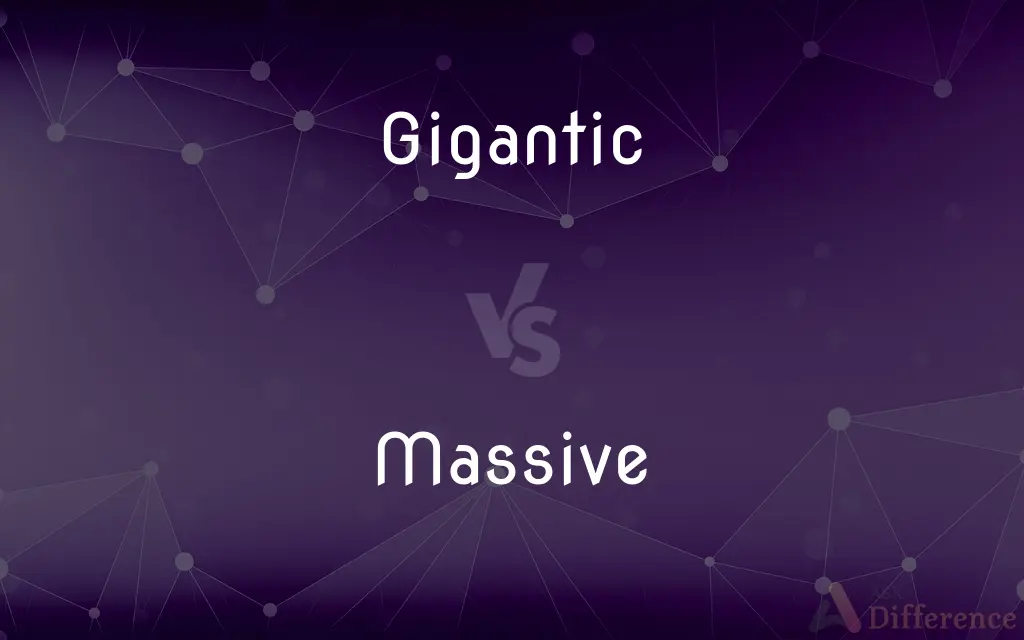Gigantic vs. Massive — What's the Difference?
By Fiza Rafique & Urooj Arif — Updated on May 8, 2024
Gigantic emphasizes extreme size, often larger-than-life, while massive suggests great scale and substantiality, particularly in weight and solidity.

Difference Between Gigantic and Massive
Table of Contents
ADVERTISEMENT
Key Differences
Gigantic often implies a sense of awe or surprise at the enormous size of an object, being more commonly used to describe something remarkably larger than the usual, whereas massive connotes a significant weight, density, or immovability.
In literature, "gigantic" is used to enhance the fantastical or extraordinary nature of characters or elements, like a gigantic monster in a story, while "massive" might describe the vastness of landscapes or structures, emphasizing their bulk and extent.
Gigantic is often associated with height or vertical dimension, such as a gigantic skyscraper, while massive is more frequently associated with both volume and weight, like a massive boulder.
The word "massive" can also imply solidity and permanence, suggesting something not easily moved or changed, whereas "gigantic" simply scales things up to an extreme size without necessarily implying weight.
In terms of impact or effect, a gigantic wave might be described for its overwhelming height and appearance, whereas a massive wave would be noted for its power and the volume of water, potentially indicating more about its force and less about its appearance.
ADVERTISEMENT
Comparison Chart
Definition
Extremely large, towering
Very large, heavy, and solid
Common Usage
Size and height
Weight, solidity, and volume
Example Objects
Buildings, animals, statues
Rocks, walls, buildings
Implied Meaning
Larger-than-life, extraordinary
Substantial, powerful
Literary Use
Enhances fantastical elements
Emphasizes bulk and permanence
Compare with Definitions
Gigantic
Extremely large or enormous.
They built a gigantic statue in the city center.
Massive
Consisting of or forming a large mass.
They had to move a massive amount of earth for the construction.
Gigantic
Mythologically large or legendary in size.
The tale featured a gigantic beast from ancient times.
Massive
Substantial in scale or scope.
The project required a massive budget.
Gigantic
Colloquially, impressively large.
He had a gigantic appetite after the hike.
Massive
Impressively large or significant.
The demonstration had a massive turnout.
Gigantic
Imposing in appearance or quality.
The mountain's presence was truly gigantic.
Massive
Large and heavy or solid.
A massive oak door stood at the entrance.
Gigantic
Surpassing the usual or expected.
The company took on a gigantic project this year.
Massive
Overwhelming in force or impact.
The storm had massive effects on the coastal village.
Gigantic
Exceedingly large in size, extent, or amount, especially for its kind
A gigantic toadstool.
Massive
Consisting of or making up a large mass; bulky, heavy, and solid
A massive piece of furniture.
Gigantic
Very great in scope or importance
A gigantic mistake.
Massive
(Physics) Having relatively high mass
A massive particle.
Gigantic
Very large.
Massive
Large or imposing, as in quantity, scope, degree, intensity, or scale
"Local defense must be reinforced by the further deterrent of massive retaliatory power" (John Foster Dulles).
Gigantic
(slang) Excellent; very good or exciting.
This band is going to be gigantic.
Massive
Large in comparison with the usual amount
A massive dose of a drug.
Gigantic
In the manner of a giant. en
Massive
Affecting a large area of bodily tissue; widespread and severe
Massive gangrene.
Gigantic
Of extraordinary size; like a giant.
Massive
(Mineralogy) Lacking internal crystalline structure; amorphous.
Gigantic
Such as a giant might use, make, or cause; immense; tremendous; extraordinarly; as, gigantic deeds; gigantic wickedness.
When descends on the AtlanticThe giganticStrom wind of the equinox.
Massive
(Geology) Without internal structure or layers and homogeneous in composition. Used of a rock.
Gigantic
So exceedingly large or extensive as to suggest a giant or mammoth;
A gigantic redwood
Gigantic disappointment
A mammoth ship
A mammoth multinational corporation
Massive
Very large in size or extent.
Compared to its counterparts from World War II, the Abrams main battle tank is truly massive.
The enlightenment comprises massive shifts in many areas of Western thought.
Massive
Very large or bulky and heavy and solid.
A massive comet or asteroid appears to have ended the era of the dinosaurs.
Massive
(informal) To a very great extent; total, utter.
Massive
(colloquial) Of particularly exceptional quality or value; awesome.
Did you see Colbert last night? He was massive!
Massive
Outstanding, beautiful.
Your dress is massive, love. Where did you get it?
Massive
(medicine) Affecting a large portion of the body, or severe.
A massive heart attack
Massive
(physics) Having a large mass.
Massive
Having any mass.
Some bosons are massive while others are massless.
Massive
(geology) Homogeneous, unstructured.
Massive
(mineralogy) Not having an obvious crystalline structure.
Massive
(mineralogy) A homogeneous mass of rock, not layered and without an obvious crystal structure.
Karst massives in western Georgia
Massive
A group of people from a locality, or sharing a collective aim, interest, etc.
Big up to the Croydon massive!
Massive
Forming, or consisting of, a large mass; compacted; weighty; heavy; massy.
Massive
In mass; not necessarily without a crystalline structure, but having no regular form; as, a mineral occurs massive.
Massive
Imposing in size or bulk or solidity;
Massive oak doors
Moore's massive sculptures
The monolithic proportions of Stalinist architecture
A monumental scale
Massive
Being the same substance throughout;
Massive silver
Massive
Imposing in scale or scope or degree or power;
Massive retaliatory power
A massive increase in oil prices
Massive changes
Massive
Consisting of great mass; containing a great quantity of matter;
Earth is the most massive of the terrestrial planets
Common Curiosities
Can both terms be used interchangeably?
While they can sometimes be used interchangeably when describing large objects or phenomena, the nuances of weight and awe differ.
Which term would be more appropriate for describing large animals?
'Gigantic' is more appropriate for emphasizing the extraordinary size of an animal, like a gigantic elephant, while 'massive' might focus on an animal's bulk, like a massive bear.
Is there a preference for using 'massive' in scientific contexts?
Yes, 'massive' is often preferred in scientific contexts to describe weight, substance, and physical properties, as it implies more about the material characteristics than 'gigantic'.
How do 'gigantic' and 'massive' apply in geological contexts?
In geology, 'gigantic' might describe something like a gigantic crater, while 'massive' could describe large, solid rock formations.
Can 'gigantic' imply exaggeration in everyday language?
Yes, 'gigantic' often implies a level of exaggeration when used colloquially, emphasizing something as larger than it realistically might be.
Which term would be preferable to describe an increase in prices or inflation?
'Massive' would be more suitable to describe a significant increase in prices or inflation, as it implies a substantial and impactful change.
How does the perception of 'gigantic' differ from 'massive' in terms of awe or intimidation?
'Gigantic' tends to evoke more awe or surprise due to its association with extraordinary size, whereas 'massive' might convey a sense of intimidation due to its implication of weight and immovability.
Which term is more likely to be used in a historical context?
'Massive' is more likely used in historical contexts to describe events, battles, or movements that had significant weight and consequence, whereas 'gigantic' might be used to describe legendary figures or mythic tales.
What is the primary difference between 'gigantic' and 'massive'?
'Gigantic' emphasizes extraordinary size and height, while 'massive' emphasizes weight, density, and bulk.
Is 'massive' more commonly used in technical descriptions than 'gigantic'?
Yes, 'massive' is more frequently used in technical and scientific descriptions because it conveys precise information about mass and solidity, which are often relevant in such contexts.
When describing ancient structures, which term is more apt and why?
'Massive' is more apt when describing ancient structures like pyramids or fortresses, emphasizing their enduring bulk and solid construction, whereas 'gigantic' might be used for elements that are unusually large, like gigantic statues.
What impact do 'gigantic' and 'massive' have in advertising?
In advertising, 'gigantic' is often used to grab attention with its implication of being remarkably large, such as in sales or features, whereas 'massive' might be used to imply robustness or durability of a product.
Can 'gigantic' and 'massive' describe emotional responses or feelings?
These terms can metaphorically describe emotions, with 'gigantic' possibly describing overwhelming joy or surprise, and 'massive' often used to convey intense feelings such as grief or pressure.
How do these terms apply to natural disasters?
'Massive' is commonly used to describe the scale and impact of natural disasters like earthquakes or floods, focusing on their strength and reach, while 'gigantic' might be used for visually overwhelming phenomena, such as a gigantic tornado.
In what contexts might 'gigantic' be seen as less formal than 'massive'?
'Gigantic' may be seen as less formal due to its common use in exaggerative, casual speech, whereas 'massive' tends to appear in more formal, factual, or technical contexts due to its implications of solidity and seriousness.
Share Your Discovery

Previous Comparison
Admiration vs. Adoration
Next Comparison
Interaction vs. CommunicationAuthor Spotlight
Written by
Fiza RafiqueFiza Rafique is a skilled content writer at AskDifference.com, where she meticulously refines and enhances written pieces. Drawing from her vast editorial expertise, Fiza ensures clarity, accuracy, and precision in every article. Passionate about language, she continually seeks to elevate the quality of content for readers worldwide.
Co-written by
Urooj ArifUrooj is a skilled content writer at Ask Difference, known for her exceptional ability to simplify complex topics into engaging and informative content. With a passion for research and a flair for clear, concise writing, she consistently delivers articles that resonate with our diverse audience.
















































